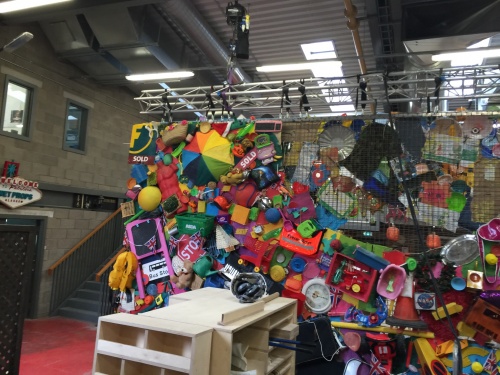Earthquakes In London: Difference between revisions
Phepplewhite (talk | contribs) No edit summary |
Phepplewhite (talk | contribs) No edit summary |
||
| Line 55: | Line 55: | ||
|[[Rachel Wells]] | |[[Rachel Wells]] | ||
|- | |- | ||
|'''Lighting | |'''Lighting Programmer''' | ||
|[[Louise Charity]] | |[[Louise Charity]] | ||
|- | |- | ||
Revision as of 11:55, 5 June 2016
| Earthquakes In London | |
|---|---|

| |
| Creative | |
| Director | Mark Thompson |
| Assistant Director | Laura |
| Set and Costume Designer | Catherine McLauchlan |
| Sound Designer | Calum Paterson |
| Video Designer | Neil Smith |
| Lighting Designer | Laura Mason |
| Production Team | |
| Stage Manager | Valentino Fabbreschi |
| Deputy Stage Manager | Babette Wickham-Riddick |
| Assistant Stage Manager | Heather McKennan |
| Assistant Stage Manager | Jack McWeeny |
| Technical Stage Manager | Stuart Leech |
| Production Electrician | Patrick Hepplewhite |
| Deputy Production Electrician | Rachel Wells |
| Lighting Programmer | Louise Charity |
| Lighting Crew | Kirstie Connel |
| Stats | |
| Venue | The Tron Main House |
| The Cockpit | |
Synopsis
The play centres on the lives and loves of three sisters, abandoned long ago by their doom-mongering father. The father is a prominent climate scientist who predicts environmental apocalypse. The eldest sister, Sarah, is a cabinet minister who plans to halt all airport expansion, choosing environment over economy. The middle sister Freya, is heavily pregnant and growing increasingly depressed about the uncertain future her child is being born into. The youngest sister, Jasmine, is a rebellious teenager and frequent nuisance to her career-minded eldest sister. As the three women attempt in their own different ways, to come to terms with the fact their father's pessimistic forecasts may be right, Freya, attempts suicide to avoid bringing her child into an apocalypic future. This show is a rollercoaster of emotion from start to finish and its frantic twists and turns only add the hightened sense of surrealism inside a very real modern world.
Technical Stage Department
Design
From the initial design white card, the technical stage department was tasked in finding a solution to hold hundreds of items on a vertical plan as a back drop. With original ideas of using a cargo net, the department got to work to try and source a net suitable with of taking the weight and also fitting into the budget. Due to the amount to items being placed on this 'cargo net' a decision was made not to use the net as several issue arose; cost, transport and safety loading. We begin to look at more structural options and with this in mind we purchased one sheet of welded wiremesh. In the first weeks of workshop time we began to load test the mesh, loading to full of items but also 4 stage weights - to a total weight of 100kg - this would allow us to hopefully take a safety factor when putting together a full structure made of wiremesh.
The go ahead was given and the production purchased 14 more sheets of 2440 x 1220 welded wiremesh panels. A piece of box steel was welded onto the top of each panel to allow the weight to be evenly distributed. Holes were then drilled to accomidate a carabiner - this would be our panel connection point to the whole structure. Due to the possible cumulative weight as each pannel is hung off each other, we decided to hang each section of wire mesh individually on two trapeze bars. The whole structure would then be hung off two 1/2 t Load Guard chain hoists onto 8m HV30 Truss.
Rehearsal Room Get-in
After discussions during a production meeting we all decided that during the tech week in the rehearsal room, if possible, the structure should be hung in the room.
Rehersal Room Load-in
Van Pack
With the show touring down to the Tron and then the Cockpit, due to the size and time it takes to erect it, the backdrop would not be traveling to London. A day before the Tron load-in, the vans would be packed. As the mesh is not going to London plus a few extra large set pieces a second van was needed to transport set from the Tron back to RCS.
Packing List
Tron Load-in
The Sunday get-in for the Tron was going to be tight for this department - only 4 hours. The Sunday priority was to get all of the structure, screen and border to be hung.
Tron Load-in Plan
Structure Build Technique

Equipment Used
Stage Management
Onstage Diagrams
Lighting
The lighting rig at The Tron was a fairly simple design to accommodate restricted production requirements as there was only small amount of time to rig, focus, plot and tech. It was compiled of a six square two coloured, lavender and open white, backlight of Fresnel. There were eight hired ETC D60 Vidid units which were used as side light to add colour and to quickly set the scene. The front light was compiled similar to black light with a two coloured wash but with stage left having a CT wash and Stage right a straw wash using a variety of profiles. There were also a couple of open white specials and LED battens and LED pars to light the back drop.
Colour Call
File:Colour_call_earthquakes_in_london.pdf
Sound Department
System Design
The System Design is based on the already fantastic in-house system within the Tron Theatre, with some minor tweaks, to make it functionally better for Earthquakes In London. The System Design is completely reflective on the overall Sound Design and was adjusted to achieve my vision for the show. Below is the System Schematic for the show:


